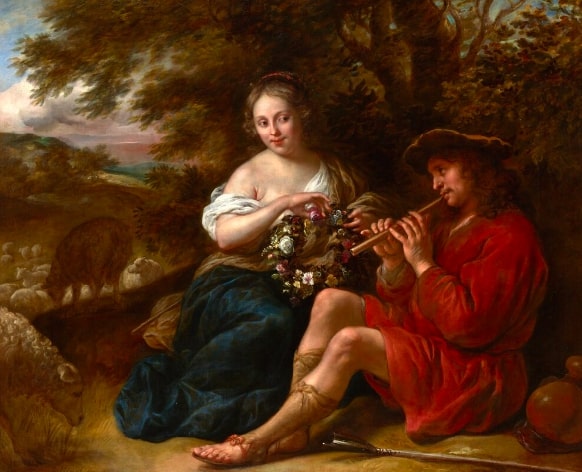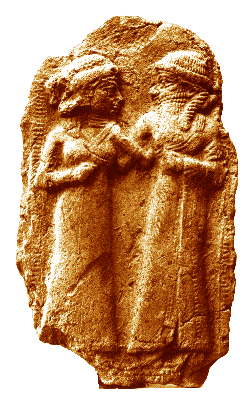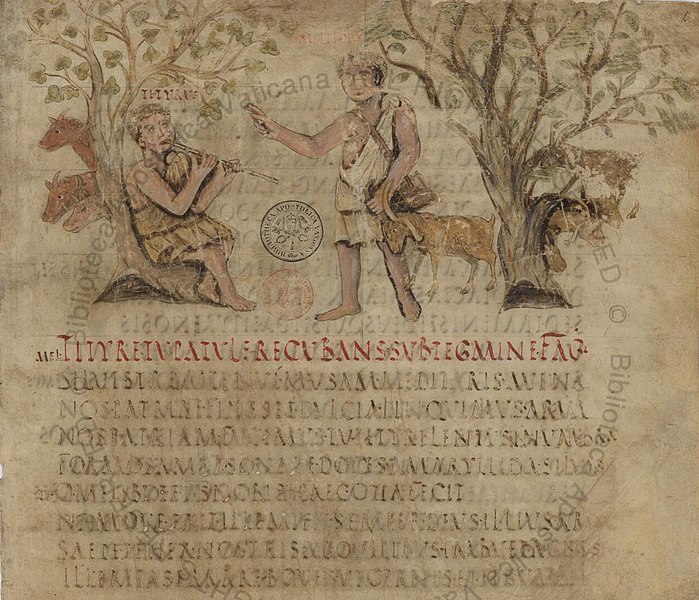Learning about the pastoral in music and recorder ensemble playing in the Apollo Summer Academy

Govaert Flinck
This august I’ll be teaching a lovely chamber music course in Holland, which includes a daily recorder ensemble session. This year I wanted to focus on a specific genre: the pastoral. The pastoral genre and its musical properties have been used throughout time, starting with some of the earliest music we still have and is still being used today.
Join the course here:
Recorder ensemble, chamber music coaching and lovely surroundings!
https://apollo-ensemble.nl/event/zomeracademie/
Here is a playlist with lots of different pastorales to get in the mood.
The pastoral was often used to allude to the “Arcadian” or utopian, to a sense of harmony with nature, to a “garden” often inhabited by shepherds and to a perfect, simple, natural life.
In this post I want to give a very short, general overview of the pastoral in music through history. Then I will make a few stops at some of the compositions I want to dive into in the upcoming course and I will give you a little information on what I plan to do in the course and of course how you can join!
Let’s start our journey!
From the dawn of civilisation, shepherds have roamed the lands. In some of the oldest texts still extant there is already reference to the God Dumizid or Tammuz, a shepherd God. This Summerian God had a flute as one of his divine objects and in this text he is described playing it:

“Oh, my only brother, do not let me perish!
On the day when Tammuz plays for me on the flute of lapis lazuli, playing it
for me with the porphyry ring.”
From Ishtar’s
Descent to the Netherworld
Presumably the flute was a reed instrument, but we are not sure. Read
a blog post about these mysterious flutes here.
We are making a bit of a step to the Ancient Greek civilization, but then again, some theorise that there may have been much more cultural hybridization between these cultures than we currently learn in school. Also Dumizid became known in Greece under the name Adonis!
In Ancient Greece, the typical instrument for shepherds was the syrinx, a type of pan flute. Shepherds playing those instruments can even be found in Homer’s Iliad (xviii, ll.525–6). We also find the first reference to pastoral music (although sadly no notation is extant): according to Aelian, Stesichorus was the first to compose ‘pastoral songs’ (boukolika melē) in the 6th century BCE.
The first literary texts we still have are from the third Century BCE. Theocritus wrote a collection called “Idylls”, which contain several pastoral texts and themes. These pastorals were probably performed in a semi-dramatic setting.
In Ancient Rome, the pastoral was usually separated from music, but Virgil’s Eclogues (or Bucolics), were performed as sung mime!

The Pastoral reenters the western arts in the 8th Century. The earliest musical sources we have are the settings of pastoral poetry by Troubadours, who were composer-musicians, often of high birth. One of those pastoral settings is the Jeu de Robin et Marion, possibly set by Adam de la Halle:
In the age of the madrigal, the pastoral, both in text and as an idea, roots itself firmly in the minds of composers. One could argue most madrigals deal with pastoral themes of love and Arcadia. One such example is Vestiva I Colli by G. Palestrina.
Luister hier naar Palestrina met geimproviseerde diminuties van The Scroll Ensemble.
Johann Schein published a collection of Diletti Pastorali, which includes an “Amarili”, a title we are probably all familiar with from Jakob van Eyck’s collection.
Jakob van Eyck’s collection of tunes includes several pastoral elements, like the song for Daphne and the Echo fantasia. The Echo was a very typical element of pastorals.
The pastoral is also to be found in the first operas. Although music, theatre and dance had been combined before, in the 16th century an interest in the Ancient ways of the Theatre started to inspire a new kind of performance. One where the text was leading, and slowly but surely, one of the vital dichotomies of Opera started to take shape: the recitative versus the aria. Also the subject matter for the libretti was inspired by topics from the Ancient Greek writers and their mythology.
For example, many of the first operas took the story of Orpheus and Eurydice as their theme. Peri’s Euridice is supposedly the earliest surviving opera, first performed on 6 October 1600.
This particular Opera is also special to us recorder players, as it has a fascinating ‘aria per tri-flauto’, a triple-recorder aria, to evoke the old shepherd syrinx no doubt. This is some of the earliest music designated for the recorder specifically (much music at the time may have been played on recorders, but was originally conceived for voices or as ‘generic dance music’).
Several 16th-century writers were also inspired by the old texts, which resulted in two texts that were used endlessly as (the basis for) opera libretti in the 17th and 18th century:
Il Pastor Fido by Giovanni Battista Guarini and Aminta by Torquato Tasso. Examples of 18th-century opera using these texts can be found with Georg Friedrich Haendel. His Acis and Galatea, which uses a sopranino recorder, is also a clear example of the Pastoral.
In later centuries opera composers will use elements of the pastoral to envoke the old, the mystical, the folk culture or the simple, such as Le Devine de Village by Rousseau.
The Pastoral also became related to Christmas. The earliest surviving collection of Christmas pastorals in Italy is the Pastorali concenti al presepe of Francesco Fiamengo (1637), written for the domestic Christmas Eve celebrations of his patron at Messina. You probably know the two famous pastoral movements in the Messiah and Johann Sebastian Bach’s Christmas Oratorio.
Arguably, the most famous use of pastoral elements at the time was by Arcangelo Corelli, in his Christmas Concerto Grosso. Corelli’s music was so famous at the time, that several of his works were arranged already back then. Did you know about the version of Corelli’s Concerti Grossi for two recorders and basso continuo? This perhaps also fits the pastoral trio sonatas written by composers in the Vienna area, like Fux, Schmelzer and others.
This is a mixture of the original for strings, but with recorder players as soloists:
Purely instrumental pastorals can already be found in the 17th century, like for example this Capriccio by Frescobaldi.
In the 19th-century Beethoven’s 6th symphony stands out as the most well-known example of the genre. Beethoven adopted many of the clichés and conventions, but in his own words wanted ‘more the expression of feeling than [realistic] painting’.
In the 19th-Century a solo instrument with irregular melodies, like a lone shepherd in the mountains, becomes another cliché, such as in the opening of Hector Berlioz’s Symphonie Fantastique’s Scène aux champs:
Franz Schubert is inspired by the beautiful poem by Goethe in his Schäfers Klagelied. It was the first of Schubert’s songs to be publicly performed. Here we find again the inspiration that the shepherd and his music can give and the idealisation of Nature, that inspired a lot of 19th Century art.
Read an analysis of the Lied here.
Moving on towards the 20th century, we find the fabulously nebulous melodies of Debussy in for example L’après-midi d’un faune, Ravel’s Daphnis et Chloé or Stravinsky’s The Rite of Spring. In these works the sound world of antiquity and pagan ritual is evoked.
In the course we will also look at Cesar Franck’s Pastorale. A wonderful work for organ, which brings together many of the elements of the pastoral that we have discussed above, but ALSO has a fugal episode in the middle, which is relatively rare for a pastoral.
Following up on conversations from last year, I’m introducing also a very unknown composer, the Dutch Dina Appeldoorn. She lived in Den Haag (where I live!) and even wrote a few songs in Esperanto. The pastorale that we will be playing in the course is seen as her most important work.
Journeying through this pastoral world, meeting these musical shepherds and their musical flocks, I also got inspired. In the Apollo Summer Academy we will look at music from all ages, but what about the earliest songs, and vice versa, what about the now? After having arranged music by others for amateurs for a while, I thought it was time to write a (short) piece myself. I take my inspiration from the Sumerian God Dumizid and Ancient Sumerian. My main aim is to write in such a way that even with no experience, recorder players can get a feel for this very different repertoire.
Hopefully I can invoke the colours and smells of the Mesopotamian Shepherds and thus we come back to the beginning of our journey.
Approach in the Course
As you will be able to see from the repertoire list, we won’t be looking at each piece in great detail. My main aim is to give you an overview of different styles of music through the lens of this single genre: the pastoral. At the same time, this will give us a simple way into analysing the music, because we have a sort of template to compare pieces through. How does the composer use the clichés of the pastoral, where and when does he or she leave it and what does that mean for our performance?
Using different approaches from my various backgrounds, like the theatre, baroque improvisation and orchestral playing, I think we will have a very rich experience!
Of course, since we have a week playing together, we will also focus on one or two of the pieces in detail, for the concerts at the end of the course.
Repertoire in the Course:
Adam de la Halle – Jeu de Robin et Marion (1285)
Jacopo Peri – Triflauto aria from Euridice (1600)
Johann Schein – O Amarilli Zart from Diletti Pastorali (1624)
Johann Sebastian Bach – Pastoral Symphony, from the Christmas Oratorio (1734)
Franz Schubert – Schäfers Klagelied (1814)
Cesar Franck – Pastorale (1860)
Dina Appeldoorn – Pastorale (1934)
Robert de Bree – Dumizid the Shepherd (2019)
All works arranged by me. Are you interested in the playing the arrangements yourself? Get in touch with me here.
Join the course here:
Are your fingers feeling itchy? Come over to Drachten (Holland) and play this repertoire under my direction:
https://apollo-ensemble.nl/event/zomeracademie/
Here is a playlist with lots of different pastorales to get in the mood.
Let me know if you have any comments or questions!